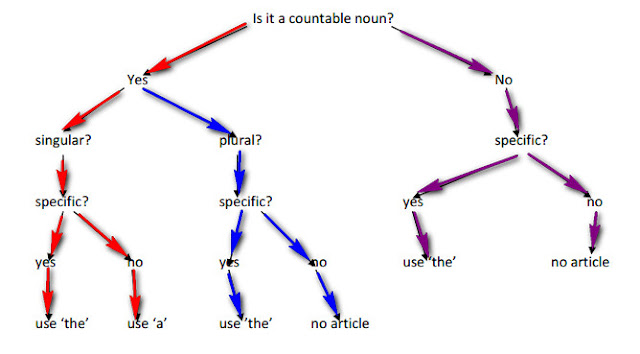Simple future-will-and-be-going-to
Simple
Future has two different forms in English: "will" and "be
going to." Although the two forms can sometimes be used
interchangeably, they often express two very different meanings. These
different meanings might seem too abstract at first, but with time and
practice, the differences will become clear. Both "will" and "be
going to" refer to a specific time in the future.
We use the simple future for:
· A decision at the moment of speaking:
A: 'I'm cold'.
B: 'I will close the window'.
A: 'I'm cold'.
B: 'I will close the window'.
· Prediction based on opinion:
I think the Conservatives will win the next election.
I think the Conservatives will win the next election.
· A future fact:
The sun will rise at 7am.
The sun will rise at 7am.
· Promises / requests / refusal /
willingness:
I'll help you with your work.
Will you give me a hand?
I will give up smoking!
I'll help you with your work.
Will you give me a hand?
I will give up smoking!
· In the same way as the future
continuous, but with state verbs:
I'll be at the station when you arrive.
I'll be at the station when you arrive.
·
To request information:
Will Tom ever pay you back?
Forms:
Subject
|
auxiliary
|
Main verbs
|
|||
Positive
|
I
|
Will
|
open
|
The door.
|
|
Positive
|
You
|
will
|
start
|
Before me.
|
|
Negative
|
She/he/it
|
will
|
not
|
help
|
Me.
|
Negative
|
we
|
will
|
not
|
be
|
At school tomorrow.
|
Question
|
Auxiliary
|
subject
|
verb
|
|
Question
|
will
|
you
|
arrive
|
On time.
|
When we use the
simple future tense in speaking, we often contract the subject and auxiliary
verb:
I will
|
I’ll
|
You will
|
You’ll
|
For negative sentences in the simple future tense, we contract with won't,
like this:
I will not
|
I won't
|
You will not
|
you won't
|
He will not
|
he won't
|
She will not
|
She won’t
|
It will not
|
It won’t
|
We will not
|
We won’t
|
They will not
|
They won’t
|
Use of be going to:
FORM Be Going To
[am/is/are + going to +
verb]Examples:
- You are going to meet Sarah tonight.
- Are you going to meet Sarah tonight?
- You are not going to meet Sarah tonight.
We use be
going to+infinitive to talk about future plans:
Example : we
are going to drive around Australia
We use 'going to' when we want to make a prediction based on evidence we
can see now.
- Look out! That cup is going to fall off.
- Look at those black clouds. It's going to rain
soon.


